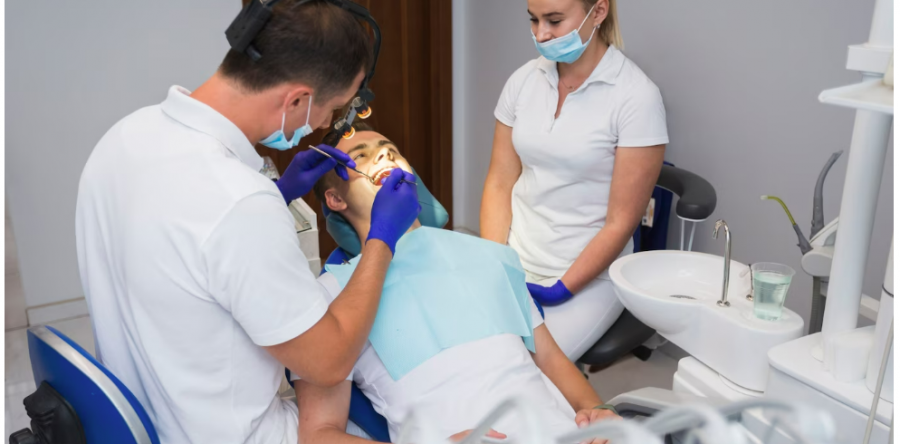Dental pain can be sudden, intense, and incredibly disruptive. Whether it’s a persistent toothache, a chipped tooth, or swelling in your jaw, many people wonder: “Can you go to emergency for dental pain?” The answer depends on the severity, type of pain, and potential underlying issues. This guide will help you understand when to visit the ER, when to see a dentist, and how to get fast, effective dental care in Milton, Ontario.
Understanding Your Dental Pain
Dental pain isn’t always straightforward. Before rushing to the emergency room, it’s important to evaluate your symptoms.
Common Types of Dental Pain
Mild Toothache
- Often caused by cavities, sensitivity, or minor gum irritation.
- Usually manageable with over-the-counter pain relievers.
Severe Toothache
- Intense, persistent pain that does not improve with basic medication.
- May indicate deep decay, pulp infection, or nerve issues.
Dental Trauma
- Chipped, broken, or knocked-out teeth from accidents or falls.
- Immediate intervention may be necessary to save the tooth.
Infection or Abscess
- Swelling, pus, or fever signals infection.
- Untreated infections can spread to the face, jaw, or bloodstream, becoming life-threatening.
Jaw or Facial Pain
- Could indicate temporomandibular joint disorders (TMJ), abscesses, or systemic conditions.
- Severe swelling or trouble opening the mouth may require urgent attention.
Pro Tip: Dental pain that worsens at night or prevents you from eating and sleeping deserves prompt professional evaluation.
Emergency Room vs Dentist
Understanding where to go is critical.
When the Emergency Room is Appropriate
- Uncontrolled bleeding from the gums or mouth
- Facial trauma from accidents, falls, or sports injuries
- Swelling spreading to the neck or face, potentially blocking airways
- High fever or systemic infection due to a dental abscess
The ER can stabilize trauma, prescribe antibiotics, or manage severe pain, but cannot perform dental procedures like fillings, extractions, or root canals.
When to See a Dentist in Milton
- Persistent toothache or sensitivity
- Chipped or broken teeth
- Knocked-out teeth (immediate dental attention can save the tooth)
- Lost fillings or crowns
- Dental abscesses requiring drainage and antibiotics
A dentist provides definitive care to treat the root cause, not just temporary relief.
How to Get Immediate Dental Care in Milton
If you’re experiencing dental pain, follow these steps:
- Call Your Dentist Immediately
- Many Milton dental clinics offer same-day emergency appointments.
- Describe your symptoms clearly: pain intensity, duration, swelling, or trauma.
- Follow Professional Advice
- Your dentist may provide instructions for pain management, medication, or indicate if ER care is needed.
- Visit the Clinic Promptly
- Quick intervention can prevent complications and save teeth.
- Dentists can perform procedures like root canals, fillings, or extractions.
- Schedule Follow-Up Care
- Even after initial treatment, follow-ups are essential to ensure proper healing and prevent future emergencies.
Tips to Prevent Dental Emergencies
- Maintain oral hygiene – brush twice daily, floss, and rinse with antiseptic mouthwash.
- Regular check-ups – schedule professional cleanings and examinations every six months.
- Protect teeth from trauma – wear mouthguards during sports.
- Avoid hard foods – chewing ice or hard candy can lead to broken teeth.
- Address issues early – do not ignore tooth sensitivity, minor pain, or early cavitie
FAQ: Can You Go to Emergency for Dental Pain?
Q1: Can all dental pain be treated at the ER?
A: No. ERs provide temporary relief for severe symptoms but cannot perform dental procedures. Visiting a dentist is necessary for definitive treatment.
Q2: What constitutes a dental emergency?
A: Severe pain, facial trauma, uncontrolled bleeding, spreading infection, or knocked-out teeth require urgent care.
Q3: How quickly should I see a dentist for a toothache?
A: Within 24–48 hours if pain is persistent or worsening. Immediate attention is critical for trauma or abscesses.
Q4: Are emergency dental clinics available in Milton?
A: Yes. Many local dental offices provide emergency appointments for urgent cases.
Q5: Can dental infections be life-threatening?
A: Yes. Untreated abscesses can spread to the jaw, neck, or bloodstream, leading to severe complications.
Conclusion
So, can you go to emergency for dental pain? Yes—but only for serious situations like trauma, uncontrolled bleeding, or severe infection. For most cases, contacting a local Milton dentist through Emergency Dental Care Service Milton ensures timely, expert care, definitive treatment, and prevention of long-term complications. Don’t ignore dental pain—seek professional help promptly to protect your oral health.

